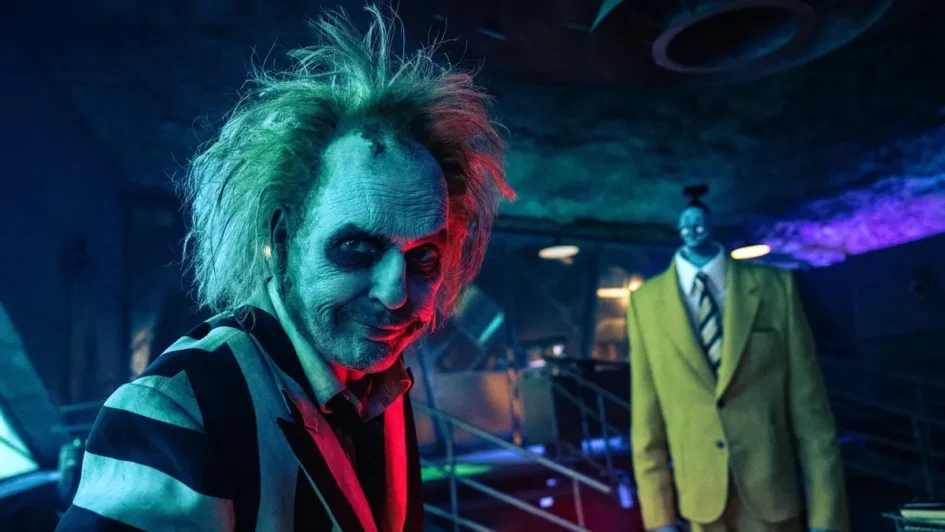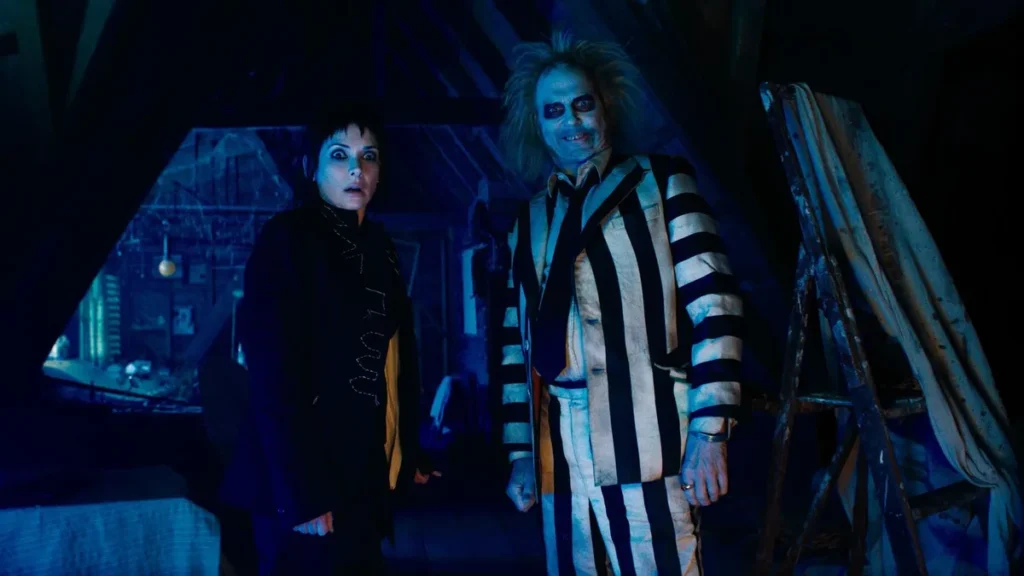I absolutely love Tim Burton’s original Beetlejuice because it perfectly captures that quirky, imaginative style that Burton is known for, blending the eerie with the humorous in a way that feels both unique and timeless. The film’s whimsical world, filled with bizarre characters like the mischievous and unpredictable Beetlejuice himself, creates a sense of fun that keeps me engaged every time I watch it, even after 30 years.
I adore how it plays with the supernatural in such a light-hearted manner, making the macabre feel accessible and entertaining, rather than scary, making it a “horror” film I can share with my kid without feeling regret. The moment Danny Elfman’s unforgettable score hits, I can’t help but get lost in the Netherworld. It’s a film that celebrates weirdness and individuality, and that, for me, is its true magic.
Beetlejuice sparked a whole wave of projects centered around the unforgettable character. Saturday mornings would find me glued to the TV, eagerly watching Beetlejuice in animated form — a tradition I’ve happily continued with my daughter to this day. I also fondly remember the Beetlejuice Graveyard Revue at Universal Studios in Florida, where the “Ghost with the Most” took center stage as the master of ceremonies in a rock-and-roll-infused musical show that quickly became a fan favorite.
More recently, the story received an incredible new life on Broadway with Beetlejuice: The Musical, a fantastic retelling that brought all the character’s chaotic charm to the stage. There’s no doubt in my mind that Beetlejuice remains one of the most iconic figures in cinema history.
And after over three decades, the beloved bio-exorcist returns to the silver screen.
Beetlejuice Beetlejuice takes place 36 years after the events of the original film, with Lydia Deetz (Winona Ryder) returning to her childhood home following the death of her father, Charles. She’s joined by her daughter, Astrid (Jenna Ortega), her boyfriend, Rory (Justin Theroux), and her quirky stepmother, Delia (Catherine O’Hara), as they all navigate the challenges of life after Charles’s passing.
Meanwhile, a certain troublemaking spirit from the afterlife has been keeping a close watch on Lydia all these years. When Beetlejuice (Michael Keaton) finds himself threatened by his vengeful ex-wife, Delores (Monica Bellucci), he has no choice but to find a way back to the land of the living to save himself from an eternal death.
Michael Keaton is the key to the success of Beetlejuice Beetlejuice. His performance is the film’s driving force, capturing the chaotic energy and offbeat humor essential for this sequel to stand out. Keaton not only meets the challenge but exceeds it, delivering a performance that balances the outrageous with the nuanced, breathing new life into his iconic character.
His portrayal goes beyond mere mimicry of the original; it demonstrates his ability to adapt, innovate, and bring fresh layers to a role he first played almost four decades ago. Keaton proves once again that he is a versatile actor, capable of seamlessly shifting between comedy, drama and the supernatural, making his presence both compelling and magnetic. His return as Beetlejuice serves as a reminder of his range and talent, showing that even after all these years, he can still surprise and captivate audiences with a performance that is as memorable as it is masterful.
Tim Burton’s decision to rely on practical effects whenever possible in Beetlejuice Beetlejuice is a refreshing departure from the CGI-heavy norm that dominates today’s blockbuster landscape. At a time when many films are created almost entirely in front of green screens, with digital effects taking center stage, Burton’s choice to use real objects, puppetry and classic in-camera tricks lends the film a tangible, textured quality that feels increasingly rare.
This old-school approach not only enhances the film’s whimsical and otherworldly atmosphere but also pays homage to the creative spirit of the original Beetlejuice. It brings a sense of authenticity and artistry to the screen, making the film stand out as a unique cinematic experience that connects with audiences in a more visceral and imaginative way.
However, Burton’s style is not without its faults.
His signature style, which heavily draws on Gothic and Victorian elements, dark humor and quirky characters, has been consistent across many of his films. For some modern viewers, this style may feel repetitive or dated, as they are already accustomed to his visual and thematic choices. Audiences today often crave innovation and freshness in storytelling and visual presentation, and Burton’s style might not seem as unique as it once did.
Modern audiences, particularly younger viewers, are often drawn to content that reflects current cultural and social issues or features more diverse perspectives and representations. Burton’s films, which frequently center on eccentric outsiders in fantastical settings, might not feel as relevant or inclusive. Additionally, his focus on a particular type of aesthetic can feel less appealing to those who prefer a more grounded or realistic approach.
Much of Tim Burton’s appeal lies in the nostalgia associated with his earlier films. These films have a significant fanbase among viewers who grew up with them. However, younger generations who did not experience these films during their peak may not have the same emotional connection to Burton’s style and storytelling. As a result, his newer works may not carry the same weight or excitement for them.
While Tim Burton’s unique style has undoubtedly left a lasting impact on cinema and continues to have a devoted fanbase, the combination of changing tastes, technological advancements and a desire for new narratives means his work may not resonate as universally with modern audiences as it once did. And Beetlejuice Beetlejuice somewhat feels weighed down by these exact issues. At moments the comedy feels forced, obviously funny in Burton’s mind, but not having the same impact with the viewing audience.
Also, much of the film feels predictable, especially for viewers familiar with his previous works.
Beetlejuice Beetlejuice earns a solid four out of five stars, driven largely by the irresistible nostalgia of seeing Michael Keaton reprise one of his most iconic roles. His return as the mischievous and manic spirit is a delight, capturing the same wild charisma that made the original Beetlejuice a cult classic, drawing fans back to the theater with high expectations — and Keaton certainly delivers.
The film captures the quirky charm, dark humor and visually inventive style that defined the 1988 original, offering plenty of moments that will satisfy long-time fans. However, the very formula that made the first film such an unexpected hit in the ’80s — a blend of zany comedy, surreal horror and offbeat characters — may feel slightly dated for modern audiences accustomed to more sophisticated or subversive storytelling.
While it succeeds in recreating the magic of the past, it occasionally struggles to find fresh ground, making it a fun, yet familiar trip down memory lane rather than a groundbreaking sequel.

